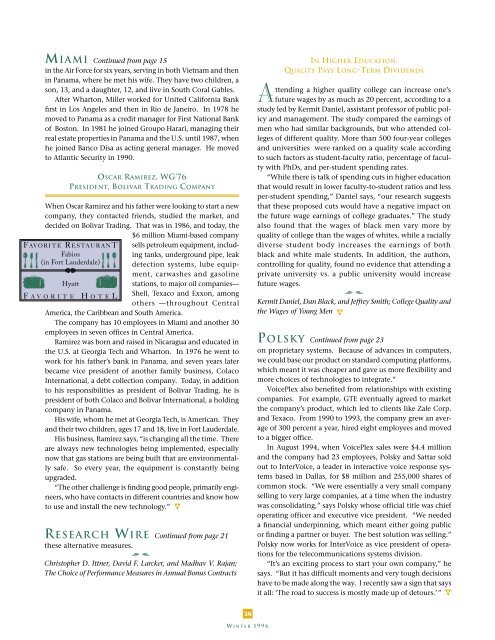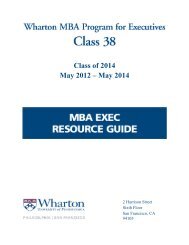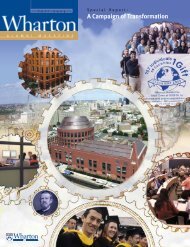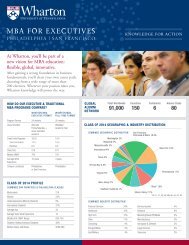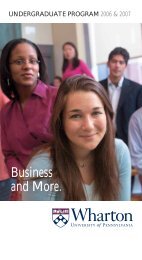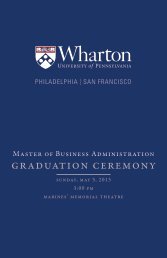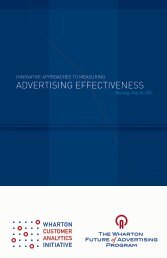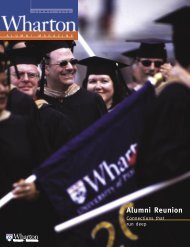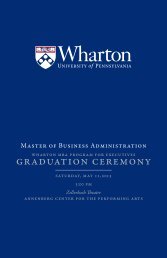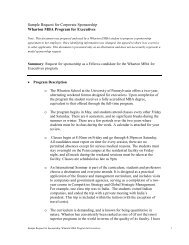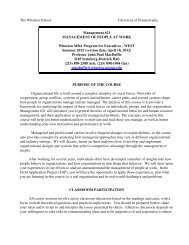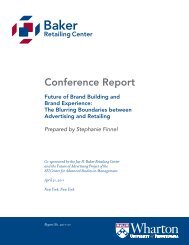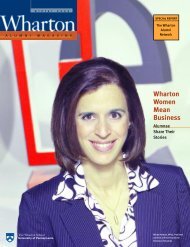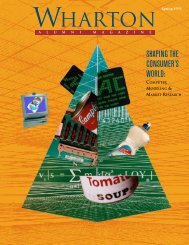wharton's prescription for health care - Wharton Magazine
wharton's prescription for health care - Wharton Magazine
wharton's prescription for health care - Wharton Magazine
Create successful ePaper yourself
Turn your PDF publications into a flip-book with our unique Google optimized e-Paper software.
MIAMI Continued from page 15in the Air Force <strong>for</strong> six years, serving in both Vietnam and thenin Panama, where he met his wife. They have two children, ason, 13, and a daughter, 12, and live in South Coral Gables.After <strong>Wharton</strong>, Miller worked <strong>for</strong> United Cali<strong>for</strong>nia Bankfirst in Los Angeles and then in Rio de Janeiro. In 1978 hemoved to Panama as a credit manager <strong>for</strong> First National Bankof Boston. In 1981 he joined Groupo Harari, managing theirreal estate properties in Panama and the U.S. until 1987, whenhe joined Banco Disa as acting general manager. He movedto Atlantic Security in 1990.OSCAR RAMIREZ, WG’76PRESIDENT, BOLIVAR TRADING COMPANYWhen Oscar Ramirez and his father were looking to start a newcompany, they contacted friends, studied the market, anddecided on Bolivar Trading. That was in 1986, and today, theFAVORITE RESTAURANTFabios(in Fort Lauderdale)rsHyattF AVORITEH OTEL$6 million Miami-based companysells petroleum equipment, includingtanks, underground pipe, leakdetection systems, lube equipment,carwashes and gasolinestations, to major oil companies—Shell, Texaco and Exxon, amongothers —throughout CentralAmerica, the Caribbean and South America.The company has 10 employees in Miami and another 30employees in seven offices in Central America.Ramirez was born and raised in Nicaragua and educated inthe U.S. at Georgia Tech and <strong>Wharton</strong>. In 1976 he went towork <strong>for</strong> his father’s bank in Panama, and seven years laterbecame vice president of another family business, ColacoInternational, a debt collection company. Today, in additionto his responsibilities as president of Bolivar Trading, he ispresident of both Colaco and Bolivar International, a holdingcompany in Panama.His wife, whom he met at Georgia Tech, is American. Theyand their two children, ages 17 and 18, live in Fort Lauderdale.His business, Ramirez says, “is changing all the time. Thereare always new technologies being implemented, especiallynow that gas stations are being built that are environmentallysafe. So every year, the equipment is constantly beingupgraded.“The other challenge is finding good people, primarily engineers,who have contacts in different countries and know howto use and install the new technology.” ”RESEARCH WIRE Continued from page 21these alternative measures.$4Christopher D. Ittner, David F. Larcker, and Madhav V. Rajan;The Choice of Per<strong>for</strong>mance Measures in Annual Bonus ContractsIN HIGHER EDUCATION,QUALITY PAYS LONG-TERM DIVIDENDSAttending a higher quality college can increase one’sfuture wages by as much as 20 percent, according to astudy led by Kermit Daniel, assistant professor of public policyand management. The study compared the earnings ofmen who had similar backgrounds, but who attended collegesof different quality. More than 500 four-year collegesand universities were ranked on a quality scale accordingto such factors as student-faculty ratio, percentage of facultywith PhDs, and per-student spending rates.“While there is talk of spending cuts in higher educationthat would result in lower faculty-to-student ratios and lessper-student spending,” Daniel says, “our research suggeststhat these proposed cuts would have a negative impact onthe future wage earnings of college graduates.” The studyalso found that the wages of black men vary more byquality of college than the wages of whites, while a raciallydiverse student body increases the earnings of bothblack and white male students. In addition, the authors,controlling <strong>for</strong> quality, found no evidence that attending aprivate university vs. a public university would increasefuture wages.$4Kermit Daniel, Dan Black, and Jeffrey Smith; College Quality andthe Wages of Young Men ”P OLSKY Continued from page 23on proprietary systems. Because of advances in computers,we could base our product on standard computing plat<strong>for</strong>ms,which meant it was cheaper and gave us more flexibility andmore choices of technologies to integrate.”VoicePlex also benefited from relationships with existingcompanies. For example, GTE eventually agreed to marketthe company’s product, which led to clients like Zale Corp.and Texaco. From 1990 to 1993, the company grew an averageof 300 percent a year, hired eight employees and movedto a bigger office.In August 1994, when VoicePlex sales were $4.4 millionand the company had 23 employees, Polsky and Sattar soldout to InterVoice, a leader in interactive voice response systemsbased in Dallas, <strong>for</strong> $8 million and 255,000 shares ofcommon stock. “We were essentially a very small companyselling to very large companies, at a time when the industrywas consolidating,” says Polsky whose official title was chiefoperating officer and executive vice president. “We neededa financial underpinning, which meant either going publicor finding a partner or buyer. The best solution was selling.”Polsky now works <strong>for</strong> InterVoice as vice president of operations<strong>for</strong> the telecommunications systems division.“It’s an exciting process to start your own company,” hesays. “But it has difficult moments and very tough decisionshave to be made along the way. I recently saw a sign that saysit all: ‘The road to success is mostly made up of detours.’” ”24W INTER 1996


